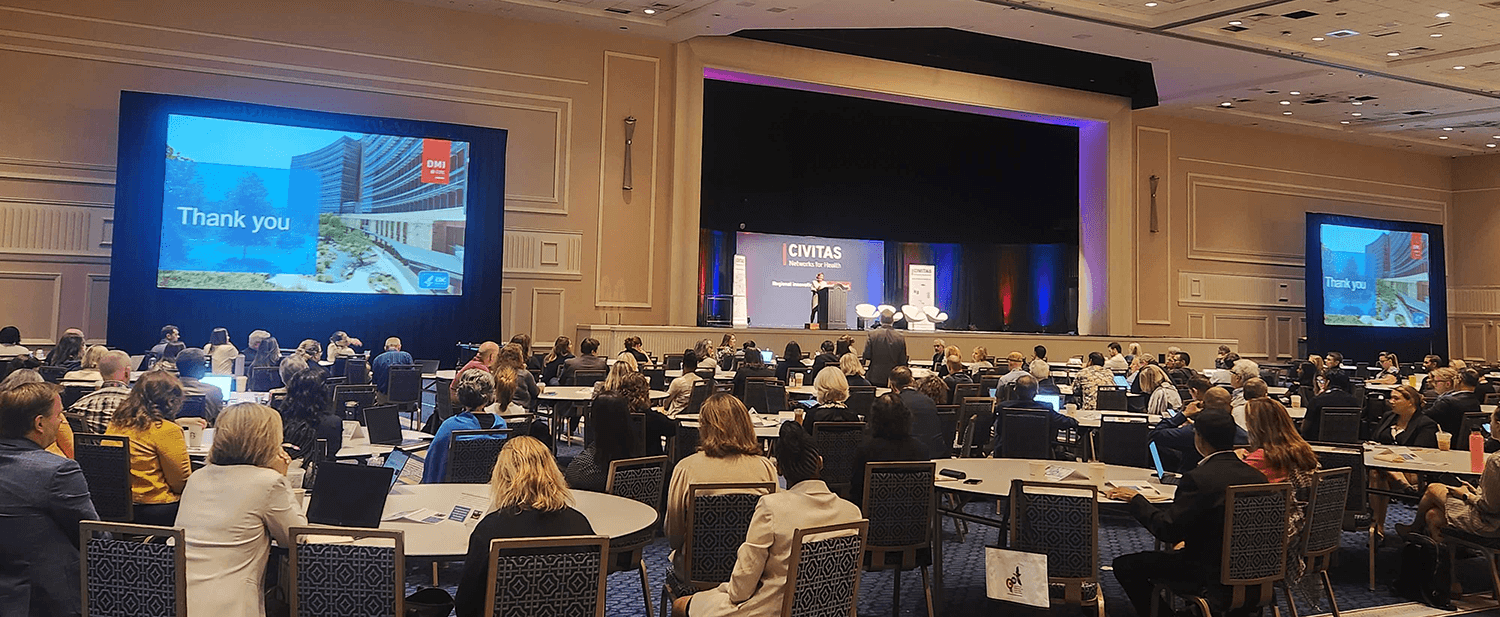
Civitas Networks for Health is a national collaborative of member organizations working to use health information exchange, health data, and multi-stakeholder, cross-sector approaches to improve health.
We’re in National Harbor, Maryland, this year for the Civitas Networks for Health 2023 Annual Conference. Join us as we recap selected sessions from this year’s events!
Leveraging Interoperability to Improve Care and Services Within American Indian and Alaska Native Communities

- Date: Monday, August 21, 2023
- Presenters:
- Krystal Schramm, MS, HILS, Michigan Health Information Network Shared Services (MiHIN)
- Angie Bass, MHA, Velatura HIE Corporation
- Joe Kachelski, Wisconsin Statewide Health Information Network
- Terri Stewart, MS, SYNCRONYS
- Overview: Speakers discussed using interoperability to enhance healthcare for American Indian and Alaskan Native communities.
Panelists in this session discussed how they leveraged interoperability to elevate healthcare services within American Indian and Alaskan Native communities. The speakers delved into the nuances of engaging with tribal groups, enhancing data sharing, and ultimately improving healthcare outcomes. There has been a historical reluctance from these communities to share data for a multitude of reasons, so it was important to build trust and foster cultural sensitivity to encourage these communities to embrace data sharing for enhanced care services.
The speakers underlined the concept of data sovereignty, wherein these communities could maintain control over their information. Strategies for fostering this sovereignty ranged from respecting tribal laws and regulations to meeting communities at their level of technological readiness. Developing this trust was essential to show that shared data can benefit tribal members significantly, especially when they frequently moved between healthcare facilities, the speakers said. It allows pertinent information to seamlessly accompany patients across different settings.
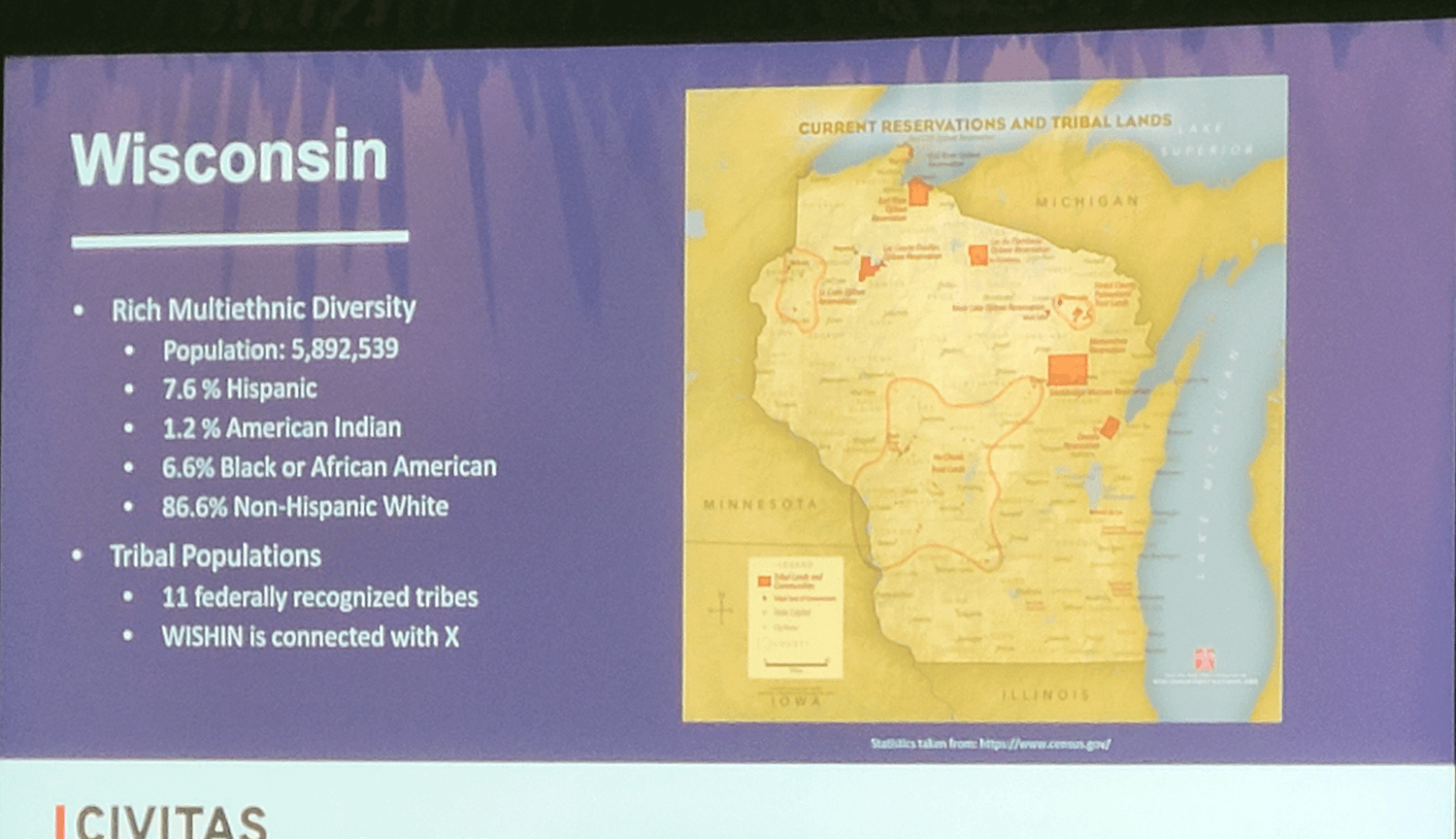
Collaboration emerged as a central theme in the conversation. The speakers shared anecdotes about how collaboration between tribal communities, healthcare facilities, and public health departments had led to meaningful insights and impactful healthcare strategies. They stressed the need for customized solutions for each community, and they acknowledged the challenges tied to demographic variations, both in terms of tribal and non-tribal facilities. It is important to provide valuable data back to tribal communities to improve population health and enable tribes to make informed decisions.
In the context of data interoperability, the speakers reflected on the evolution of terminology and its cultural implications. They discussed the ongoing journey of understanding and addressing the unique needs of American Indian and Alaskan Native communities within the broader healthcare framework. The session concluded with an emphasis on continual learning and the necessity of inclusive, collaborative efforts that respected these communities’ diversity and cultural sensitivities.
The Power of Data Sharing and Women, Infants, and Children (WIC)

- Date: Monday, August 21, 2023
- Presenters:
- Timi Leslie, BluePath Health/Connecting for Better Health
- Priti Rane, MPH, San Francisco Department of Public Health (SFDPH)
- Dan Chavez, Serving Communities Health Information Organization (formerly Santa Cruz HIO
- Overview: Speakers highlighted the challenges and intricacies of WIC program enrollment due to complex requirements, stressing the importance of collaboration and urging attendees to drive improvements in the process.
In this session, the speakers delved into the complexities and challenges of healthcare data sharing and enrollment processes within the context of the Special Supplemental Nutrition Program for Women, Infants, and Children (WIC) program. The federal program provides grants to states for supplemental foods, health care referrals, and nutrition education for low-income pregnant, breastfeeding, and non-breastfeeding postpartum women, and to infants and children up to age five at nutritional risk.
The speakers discussed the critical issue of eligible individuals not being enrolled due to cumbersome requirements, with an estimated six million people missing out on benefits. They stressed the need for more efficient organizational communication and collaboration to streamline enrollment procedures.
Interoperability and data sharing are difficult currently because of the way WIC is funded under the US Department of Agriculture. Bridging the gap between providers, patients, and social services is vital to ensure that individuals receive the benefits they are entitled to within the current rules and regulations.
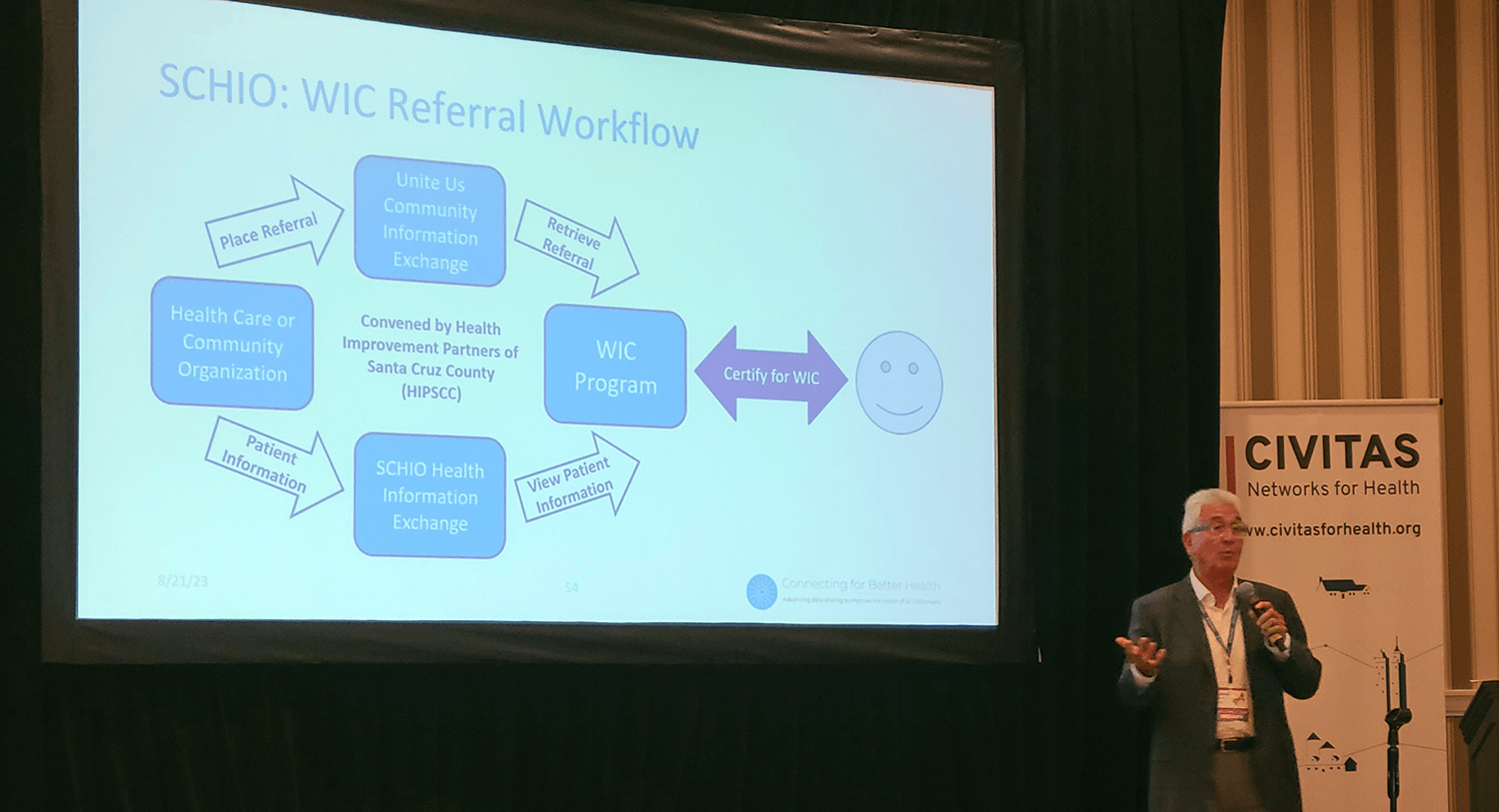
The speakers then moved into the workflow and processes of sharing data and referrals within the WIC programs, with some parts of California using EPIC with Unite Us as the referral platform. They described how providers use the information shared to reach out to patients and families, often engaging in outbound phone calls or remote contact to facilitate enrollment. The system’s flexibility and adaptability are notable, particularly in reaching marginalized populations and easing family burdens.
Throughout the session, the speakers examined the challenges of data timeliness and eligibility criteria. The timeliness of data exchange is critical for effective healthcare delivery, with demographic information needing to be current within the last 90 days. However, there are hurdles in adapting to changing regulations, and collaboration between WIC organizations, providers, and other stakeholders is needed to overcome these challenges. The speakers highlighted the significance of finding the right use cases to implement efficient systems and the importance of legislative discussions to facilitate positive changes in healthcare enrollment procedures.
The speakers closed the session by encouraging attendees to join in further discussions to drive improvements and innovations in the healthcare enrollment process.
General Session: The Other 80 Podcast Live Recording: Why Implementation Matters with Jennifer Pahlka and Claudia Williams

- Date: Monday, August 21, 2023
- Presenters:
- Jennifer Pahlka
- Claudia Williams
- Overview: Jennifer Pahlka and Claudia Williams discussed challenges in policy, implementation, ecosystems, and leadership; the gap between policy intent and execution; cultural divides in policymaking; benefits of bringing implementers into policy development; ecosystem complexities; and the significance of trust, cooperation, and shared value in managing ecosystems and building data networks.
Claudia Williams hosted a live taping of the podcast The Other 80 in the main presentation space at Civitas. Her guest was Jennifer Pahlka, who wrote the book Recoding America: Why Government Is Failing in the Digital Age and How We Can Do Better.
There are many challenges and intricacies in policymaking, specifically around implementation review and follow-up after a policy has been implemented. In her book, Pahlka explains that despite the hard work to pass ambitious policies, often those policies don’t have the impact that we’d hoped for.
 Pahlka and Williams highlighted the significance of understanding the gap between policy intent and actual implementation, as policymakers may not always have achieved what Congress intended due to bureaucratic complexities and the burdens that may be in place during actual, practical implementation. For example, there have been instances where a public servant’s deviation from Congress’s literal instructions led to more effective outcomes. A feedback loop is also important because it allows policymakers to adjust their strategies based on implementation insights, fostering a more collaborative process.
Pahlka and Williams highlighted the significance of understanding the gap between policy intent and actual implementation, as policymakers may not always have achieved what Congress intended due to bureaucratic complexities and the burdens that may be in place during actual, practical implementation. For example, there have been instances where a public servant’s deviation from Congress’s literal instructions led to more effective outcomes. A feedback loop is also important because it allows policymakers to adjust their strategies based on implementation insights, fostering a more collaborative process.
Pahlka and Williams highlighted the significance of understanding the gap between policy intent and actual implementation, as policymakers may not always have achieved what Congress intended due to bureaucratic complexities and the burdens that may be in place during practical implementation. For example, there have been instances where a public servant’s deviation from Congress’s literal instructions led to more effective outcomes. A feedback loop is also important because it allows policymakers to adjust their strategies based on implementation insights, fostering a more collaborative process.
Pahlka and Williams explored the realm of ecosystems next, particularly within the healthcare sector. They compared the ecosystem perspective to traditional top-down policymaking, revealing that complex ecosystems require a collaborative, adaptive, and iterative approach. Pahlka and Williams drew upon the analogy of Agile software development to illustrate the benefits of implementing feedback loops and empowering implementers at various levels to make real-time adjustments based on real-world observations. This approach stood in contrast to deterministic policymaking and acknowledged the role of uncertainty in complex systems.
Pahlka and Williams then discussed the challenges of managing these complex health ecosystems and building public-private data networks, underlining the importance of trust, cooperation, and shared values among different parties to reach the shared goal.
They concluded the discussion by highlighting crucial leadership lessons: setting realistic expectations, acknowledging imperfections, embracing the likelihood of failures, and communicating these aspects to stakeholders at the outset could mitigate larger disruptions later on.
What’s Next for the Public Health and Immunization Data Ecosystem?

- Date: Tuesday, August 22, 2023
- Presenters:
- Sonia Chambers, West Virginia Health Information Network
- Kate Ricker, Civitas Networks for Health
- Elizabeth Ruebush, Association of State & Territorial Health Officials
- Dan Paoletti, Ohio Health Information Partnership
- Overview: The session highlighted the significance of partnerships in health information exchange (HIE) and data sharing within public health, addressing challenges, successful strategies, and the vital role of collaborative efforts with various entities for improved healthcare outcomes while navigating complexities and building trust.
This session focused on health information exchange (HIE) and data sharing within public health, discussing the lessons learned, challenges faced, and successful strategies employed to facilitate data sharing for improved healthcare outcomes, specifically around immunization data.
Historically, there have been many challenges aggregating and sharing immunization data, but each little crack in the door to success can open the door a little more until you finally achieve your goals.
Partnerships between HIEs and other entities are significant in the data-sharing landscape. Collaborative efforts between HIEs and health plans, hospitals, doctors, pathways hubs, and government agencies are a means to overcome challenges and enhance public health initiatives. However, while partnerships are pivotal, the nature of data exchange often leads to difficulties in establishing relationships. The speakers underscored the critical need to navigate this complexity and build trust.
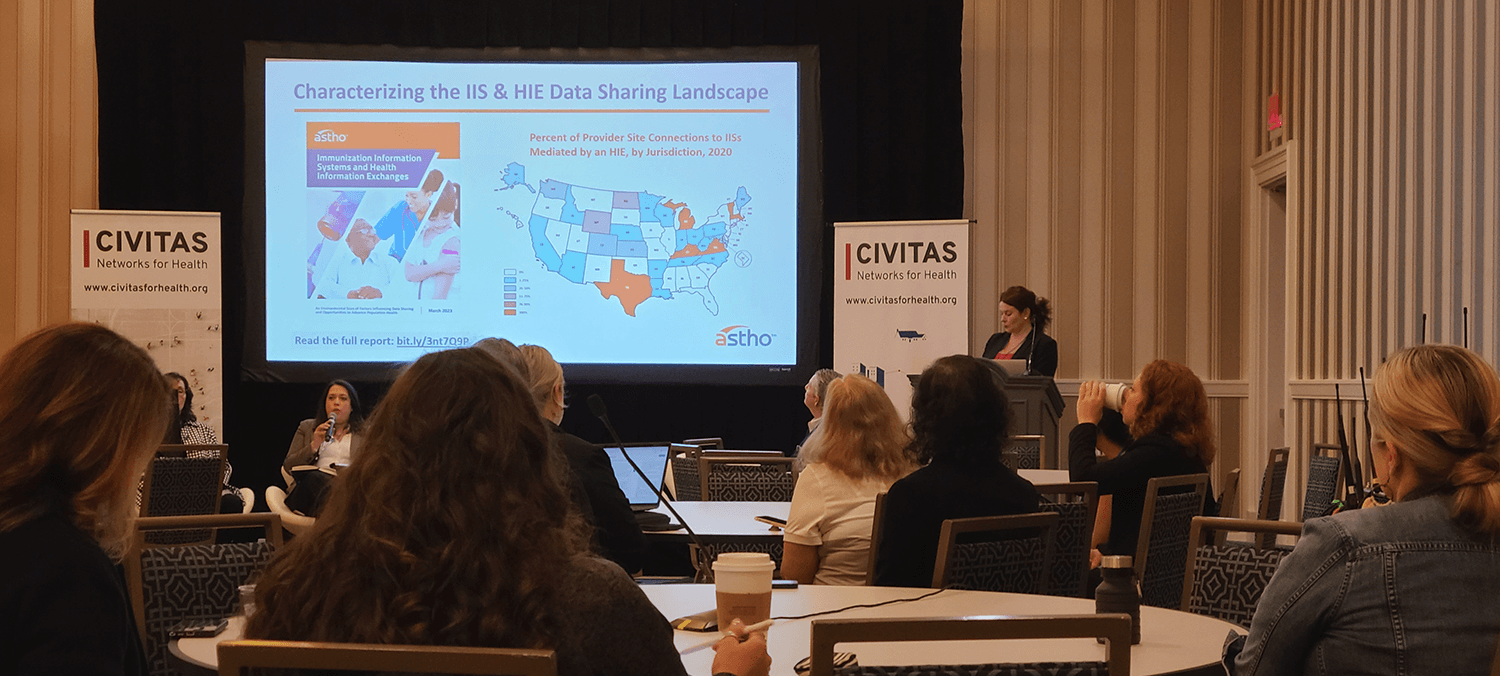
COVID-19 emerged as a crucial backdrop throughout the discussion. The speakers recounted challenges faced during the pandemic, particularly regarding electronic reporting and data sharing related to COVID-19 testing and vaccinations. This real-world context underscored the urgency and complexity of data-sharing initiatives, particularly in crises. The pandemic also exemplified the value of accurate and timely data as a source of truth for public health decision-making.
The speakers also emphasized the importance of dialogues with public health departments to understand their unique priorities and goals. Aligning data-sharing efforts with these entities requires a nuanced approach, as the value proposition for public health departments might differ from that of other stakeholders. However, with patience and persistence, given the overwhelming challenges public health agencies face, HIEs can offer assistance that could make their tasks more manageable—and offer alliances in areas where there is overlap in data-sharing efforts.
TEFCA From a Participant Perspective

- Date: Tuesday, August 22, 2023
- Presenters:
- Erica Galvez, Manifest MedEx
- Kathryn Bingman, eHealth Exchange
- Phil Beckett, PhD, C3HIE
- Overview: Leaders from various health information exchange organizations discussed challenges, opportunities, and developments in the HIE landscape, including merging networks, consent management complexities, technical hurdles, and evolving healthcare data standards.
Many challenges, opportunities, and developments exist in the health information exchange (HIE) field, specifically around the TEFCA and the implementation roadmap and the requirements for that legislation.
Leaders from Manifest MedEx, eHealth Exchange, and C3HIE began their session by discussing some of these challenges, one being the value and purpose of sharing health data between different organizations and networks. There was discussion about which, if any, participants have decided whether they would be joining a QHIN, which is a requirement for adherence to TEFCA. While the goal of standardization and patient-centered data through TEFCA has its benefits, complexities and potential redundancies can arise from it as well.
The topic of consent management and the complexities surrounding patient data privacy and sharing came up next. Various participants shared their experiences and concerns regarding obtaining patient consent for data exchange. Regulations have evolved, and patient awareness has grown. There are challenges in establishing granular consent, addressing redacted information, and ensuring valid consent for emergency situations (break-the-glass access). The speakers discussed the potential need for a federated model that relies on individual health information organizations to manage and validate consent based on their close proximity to patients.
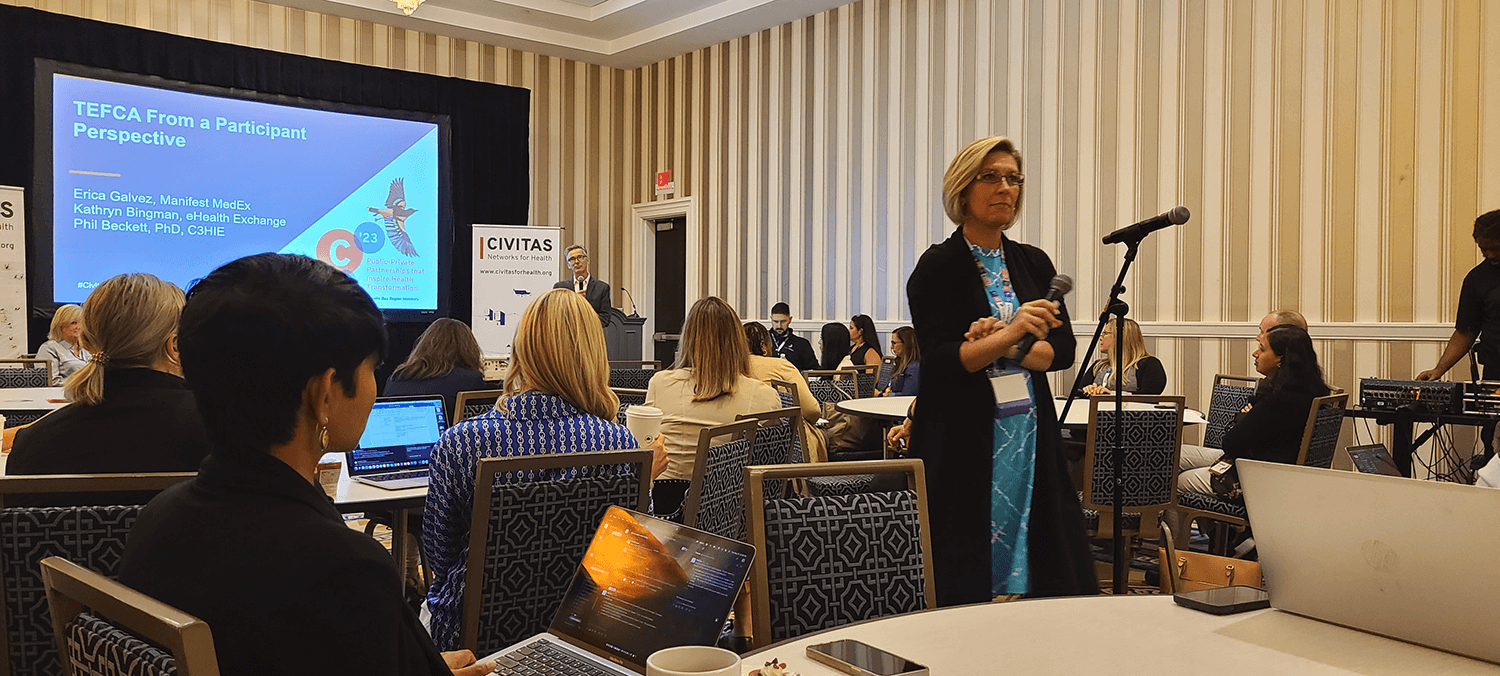
The speakers then turned to the technical and operational aspects of data exchange by exploring the potential for exchanging medical images and diagnostic data and identifying challenges, such as differing protocols and vendor capabilities. Electronic health records (EHRs) and interoperability in data exchange, with EHR vendors like Epic, also play a pivotal role in influencing the landscape, and the speakers discussed the practical difficulties of integrating various EHR systems, ensuring data quality, and meeting interoperability requirements. There was a lot of discussion around the more technical aspects of TEFCA requirements for messaging, with most participants noting that the messaging protocol required was one that has been barely implemented by anyone, with no mention in the legislation of the standard messaging currently most widely used.
There was a lot of really great discussion, spirited at times, about TEFCA, the implications of joining or not, the future roadmaps, and the potential role of HIEs within that broader landscape. The session concluded with the promise of additional discussions and continuing the great dialogue that had been going on at Civitas.
Thank you for joining us for our 2023 Civitas recap!
J2 Interactive is an award-winning software development and IT consulting firm specializing in customized solutions for hospitals, labs, research institutions, and health information exchanges.
Our approach to design and development is rooted in a fundamental belief that systems succeed or fail based on how well they serve the people who depend upon them. Drop us a line to learn more.


